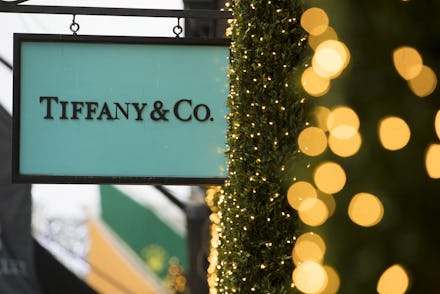What the acquisition of Tiffany & Co. says about the future of luxury retail

It’s the time of year for spending money on high-end jewelry. The holiday season is usually when you see commercials for diamond brooches and other expensive jewels you'd typically find at a retailer like Tiffany's. LVMH took things a bit further and bought the whole company. On Monday, the European fashion house formally announced its purchase of the New York jeweler for $16.2 billion, months after LVMH initially offered $14.5 billion for the company. According to CNN Business, the deal is the largest in the history of the luxury sector.
The sale of Tiffany & Co. comes after a less than stellar year for the jewelry company, which has experienced a slump in sales. The brand has long been associated with creating jewelry for “grandmothers” and has been seeking out ways to reach millennial audiences.
"I was hired as a CEO to figure out why such a great brand wasn't growing," Alessandro Bogliolo told The Times of London in September. "The responsibility of protecting the legacy is huge, but you run the risk of losing touch with the world.”
The sale to LVMH might help the company with the goal of reaching younger buyers. LVMH owns several other successful brands, including Rihanna’s Fenty line, and LVMH is the most successful business in the luxury sector. By adding Tiffany & Co. to their roster, LVMH will have the opportunity to expand into the jewelry and watch business. LVMH already owns TAG Heuer and Hublot.
“We have an immense respect and admiration for Tiffany and intend to develop this jewel with the same dedication and commitment that we have applied to each and every one of our Maisons,” Bernard Arnault, the CEO and Chairman of LVMH, said in a statement. “We will be proud to have Tiffany sit alongside our iconic brands and look forward to ensuring that Tiffany continues to thrive for centuries to come.”
Tiffany chairman Roger N. Farah said in a statement that the sale was an "an exciting path forward with a group that appreciates and will invest in Tiffany's unique assets and strong human capital." Bogliolo said the sale “will provide further support, resources, and momentum for those priorities as we evolve towards becoming The Next Generation Luxury Jeweler,” in the same statement.
The purchase of Tiffany comes at a time when many luxury brands are consolidating. According to The Independent, mergers, and acquisitions rose by 15% in 2017. Christian Dior was recently purchased by LVMH in an order to help keep the legacy brand afloat as the industry continues to shift. The future of luxury fashion will likely consist of more of these mergers.
The sale of Tiffany & Co. to LVMH will be completed in the middle of 2020.
Correction: A previous version of this story misstated the 2017 acquisition of Christian Dior as YSL. It has been updated to accurately reflect the deal.